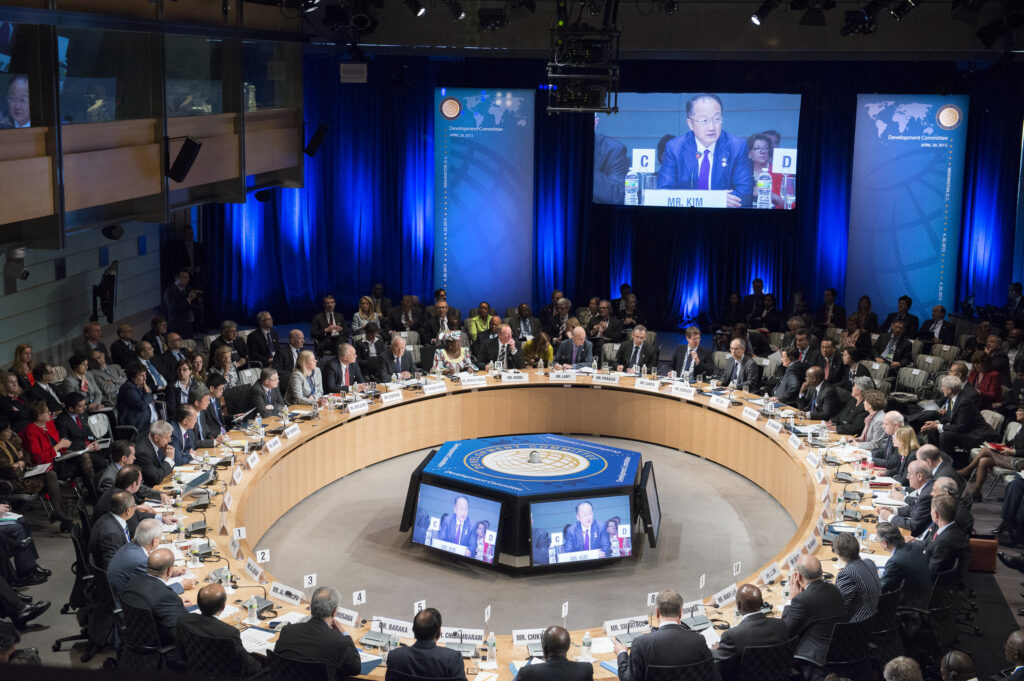Hundreds of global finance leaders will come to Washington this week. They each have a single goal: to find the right person to negotiate a trade deal with.
The International Monetary Fund and World Bank Group host semi-annual gatherings. These events are bustling with high-level multilateral policy talks. Finance ministers also hold one-on-one meetings. They are eager to broker deals on project financing, foreign investment, and debt relief for poorer economies.
This year, tariffs will dominate the agenda. Instead of policy coordination on climate change, inflation, and financial support for Ukraine, tariffs are the focus.
Specifically, attendees will focus on how to escape or minimize the impact of U.S. President Donald Trump’s steep import taxes. Trump has initiated an unprecedented barrage since his return to the White House in January.
New U.S. Treasury Secretary Scott Bessent may be the central figure. He is Trump’s lead negotiator for tariff deals. His support for the IMF and World Bank is uncertain.
Josh Lipsky, senior director of the Atlantic Council’s GeoEconomics Center, stated, “Trade wars will dominate the week, as will the bilateral negotiations that nearly every country is trying to pursue in some way, shape or form.” He added, “So this becomes a Spring Meetings unlike any others, dominated by one single issue.”
The IMF will release its economic forecasts on Tuesday. Trump’s tariffs are already negatively impacting these forecasts. This will increase pressure on developing country debt burdens.
IMF Managing Director Kristalina Georgieva said that the World Economic Outlook’s growth projections will include “notable markdowns but not recession.” The reason is largely due to “off the charts” uncertainty and market volatility caused by the tariff turmoil.
Georgieva stated that the world’s real economy continues to function well. However, she warned that negative perceptions about the trade turmoil and recession concerns could slow economic activity.
Lipsky said a potential new challenge for policymakers is whether the dollar will still be a safe haven asset. Trump’s tariffs sparked a sell-off in U.S. Treasury debt.
The IMF and World Bank meetings, along with a Group of 20 finance leaders gathering, have been crucial forums. They coordinate forceful policy actions in times of crisis, like the COVID-19 pandemic and the 2008-2009 global financial crisis.
This time, delegations will prioritize their own economies, according to policy experts. Trade ministers will also attend.
Nancy Lee, a former U.S. Treasury official and senior policy fellow at the Center for Global Development, said, “The focus of these meetings in the past couple of years, which has been heavily on multilateral development bank reform and to some extent on strengthening the sovereign debt architecture, will fall by the wayside.”
Japan is under pressure from Trump’s tariffs. The tariffs include 25% on autos and steel and reciprocal tariffs that could hit 24%. Japan is eager to secure a U.S. tariff deal quickly.
Japanese Finance Minister Katsunobu Kato is expected to meet with Bessent. With talks more advanced than other countries and participation by Trump, they will resume negotiations. The meeting will occur on the sidelines of the IMF and World Bank gathering.
South Korean Finance Minister Choi Sang-mok accepted an invitation from Bessent to meet this week. Seoul’s finance ministry said they will discuss trade. The export-dependent U.S. ally seeks to delay the implementation of 25% tariffs. They also want to cooperate with the U.S. on areas such as energy and shipbuilding.
Many participants question the Trump administration’s support for the IMF and World Bank. Project 2025 calls for the U.S. to withdraw from the institutions. This hard-right Republican policy manifesto has influenced many of Trump’s decisions.
Lee said, “I really see a key role for Secretary Bessent in these meetings to answer some very basic questions.” Lee added, “First and foremost, does the U.S. view support for MDBs (multilateral development banks) as in its interest?”
World Bank President Ajay Banga said he has had constructive discussions with the Trump administration. However, he does not know if it will fund the $4 billion U.S. contribution to the bank’s fund for the world’s poorest countries. The Biden administration pledged this contribution last year.
Banga is expected to expand on the bank’s energy financing pivot this week. The pivot will shift from primarily renewables to include nuclear and more gas projects. There will also be a shift towards more climate adaptation projects. This mix aligns better with Trump’s priorities.
Bessent supported the IMF’s new, $20 billion loan program for Argentina. He traveled to Buenos Aires last week to show support for the country’s economic reforms. He stated that the U.S. wanted more such alternatives to “rapacious” bilateral loan deals with China.
Three former career Treasury officials who later represented the U.S. on the IMF executive board called the Fund “a great financial deal for America.”
Meg Lundsager, Elizabeth Shortino, and Mark Sobel stated in an opinion piece that the IMF offers the U.S. substantial economic influence at virtually zero cost. The U.S. is the dominant shareholder.
They wrote, “If the U.S. steps back from the IMF, China wins.” They also wrote, “Our influence allows us to shape the IMF to achieve American priorities.”
Click here for more Banking news.


